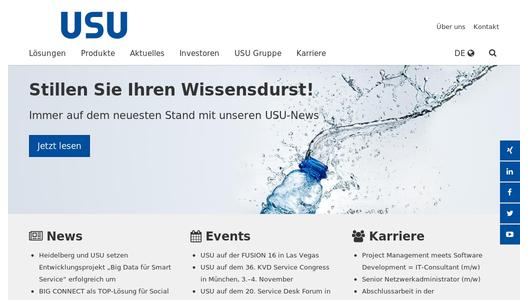With this in mind, the two companies have agreed to extend their successful and comprehensive partnership in the field of data analysis using the jointly developed big data analytics platform.
“The main way we are addressing the change in the business models of print shops in the digital age is by working with our technology partner USU to increase machine availability for our customers.” says Harald Weimer, Member of the Management Board Heidelberg Sales and Services. “It won’t be enough in the future to just offer good service. Instead what we need to be doing is looking ahead to prevent machine-related interruptions of production and optimally planning maintenance. How can we do this? By evaluating daily information supplied by the status data of the machines in question. In doing so we transform big data into valuable smart data that we can then use to develop smart services and increase our customers’ productivity.”
Predictive Monitoring and Performance Plus are two Heidelberg services that use this technology and have already been successfully launched in key markets. Heidelberg is pioneer in the field of innovative services. It uses state-of-the-art, scalable technological and analysis capabilities to both improve existing service processes and develop new service packages. Predictive Monitoring involves evaluating the machine data in order to identify emerging faults early on and avoid them through planned service measures before they result in unplanned machine failures. The goal is to achieve maximum machine availability through intelligent, proactive action.
With Performance Plus, Heidelberg offers a consulting service aimed at improving the entire production environment by working together and sharing the successes achieved. In order to improve the efficiency of a production system comprising people, press, and process, losses in the form of time, speed, and quality must be identified and eliminated. This is done by analyzing and constantly monitoring both technical and process data using big data analytics. When complemented by on-site analyses and lean management methods, significant and sustainable improvements in productivity can be achieved. “In many projects we have already been able to improve output by up to 40 per cent, and in this way achieve six-digit cost savings for the customer over the project lifetime,” says Harald Weimer.
However, big data analytics would not be possible without the ever increasing number of machines being connected via Remote Services. Most Heidelberg printing machines today are connected on installation. There are now 10,000 machines and 15,000 Prinect software modules regularly supplying machine and process data to the cloud.
USU Industrial Smart Services
Heidelberg is currently using the USU Industrial Smart Services cloud. This big data platform was developed by USU on the basis of open source components, a powerful complex event processing (CEP) engine in combination with a rule editor and machine learning components. Heidelberg uses this technology stack to develop and operate its Smart Services.
As well as processing historical data in order to identify unfamiliar failure patterns, new data can be instantly integrated into the active process and therefore very quickly processed in order to pass on decisions to subsequent processes. Analytical methods tailored specifically to machine and plant engineering are available, for example to carry out correlation analyses, cluster analyses, detection of trend changes, prediction, and anomaly detection. This offers Heidelberg highest flexibility for future product and services development to further drive the digital transformation and offer customers a concrete competitive edge with new data-based services.
“The ‘Big Data for Smart Service’ project by Heidelberg and USU is based on a successful partnership. The combination of both partners’ professional and technical competence enabled a very fast rollout of the new data-based services like Predictive Monitoring on the basis of our big data analytics platform. These will be a key component of the Heidelberg Assistant. We are very pleased with this success, which was confirmed by the Digital Leader Award 2016. Further intensification of the cooperation will provide the basis for further expansion of the service business models at Heidelberg,” says Henrik Oppermann, Business Unit Manager at USU Software AG.
Heidelberger Druckmaschinen AG
Heidelberger Druckmaschinen Aktiengesellschaft (Heidelberg) has been a major provider and reliable partner to the global printing industry for many years. We offer our customers all the components tailored to their requirements for successful business operations; we are advancing the digitalization of the industry, providing integrated and reliable production processes, financially optimal investments and smooth access to all necessary materials.
We have geared our portfolio towards the growth segments of our industry. It is based on equipment, service and consumables. Services and consumables together account for around half of total Group sales. Within our portfolio we are continuing to expand the growth segments of packaging, digital and services through partnerships as well. On the one hand, the priority is to integrate and automate customers’ entire value chains and thereby to enhance the competitiveness of print shops. Also, system operations will be both increasingly smart and autonomous in the future with the right services. On the other hand, new digital printing offerings target customers’ expanded business models.
In total around 11,500 people worldwide work for Heidelberg, around a third of them in our global sales and service network. With our own sales and service branches and via partners, we supply our customers all over the world with products, services and consumables, generating consolidated sales of around € 2.5 billion in the 2015 / 2016 reporting year.

